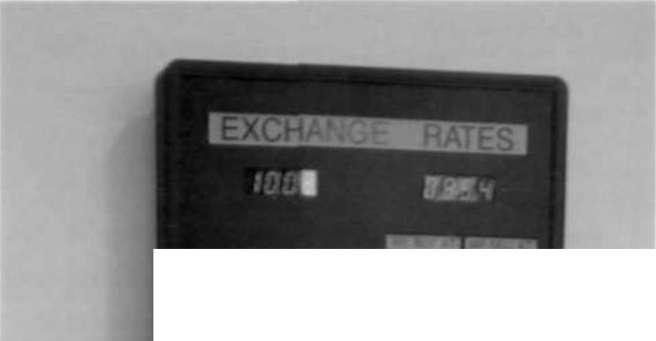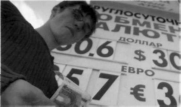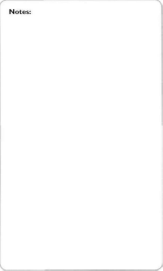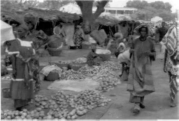ВУЗ: Не указан
Категория: Не указан
Дисциплина: Не указана
Добавлен: 18.10.2024
Просмотров: 248
Скачиваний: 1
A change in the exchange rate of a currency can have a big impact on the economy. For example, it can have a big impact on the economy's balance of pay ments. As we saw in the example earlier, when a currency gets stronger, imports Ix'eome cheaper. Hut at the same time, exports to overseas customers get more expensive. This will probably mean that more money will llow out of the economy than in.
0 E Comprehension
Now read the text again and answer these questions in your own words in the space provided.
How many countries currently use the euro?
What must you do if you want to buy something from another country?
How is the exchange rate between currencies set?
What two things can make the demand for a currency increase?
Hut
what makes the exchange rate changeV 'Го understand this, just
think ol the exchange rate as the price of the currency. Just like
any other commodity, the price of я currency is decided by supply
and demand in the market. The rate set will 1ч.' the equilibrium
point where supply and demand meet.
96
I*
к
: ч» ft « Guide to honopnu U n * r 18
Before you listen
Discuss the following with your partner.
A change in the exchange rate will make a currency stronger or weaker against other currencies. How will this affect the rest of the economy? Try to put the effects under the correct heading.
economy grows
economy shrinks
-> exports fall
exports grow
imports are cheaper
rate of inflation falls
Notes:
Effects
of a weak currency
f F
Listening H)))
Now
listen and check your answers.
Effects of a strong currency
G Speaking
Discuss these questions with your partner.
Do you think we could have one currency for the whole world? Why Why not?
What would it be like to tare vr. л closed economy?
Task
Give a two-minute talk about closed and open economies. First, read text 1 again and the listening summary on page 94 and make notes below on the following.
what is an open economy and what is a closed economy
closed and open economies in history
Pronunciation
guide
Insurance
гфог.ш*. Phoenicians
i.m:: Deficit
defiMt Autarchy
nek Mediterranean
im'iln.neini.im Euro
Sterling
>t :i.i: Import
in inipn
Notes:
Answer this essay question:'What is the exchange rate and how does it affect the economy?'
Essay about exchange rates
First, read text 2 again and the notes from the listening exercise on page 96 and make notes. Use tins essay pi а г to help you. and include these words and phrases:
Organising ideas:first of all, next, furthermore, in addition, in a number of ways
Describing cause and effect:as a result, consequently, this leads to. due to
PARAGRAPH 1
What are currencies?
How do countries trade with one another?
PARAGRAPH 2
What w the exchange rate? How is the exchange rate set?
PARAGRAPH 3
What is the balance of payments?
How does the exchange rate affect imports
and expons?
PARAGRAPH 4
What other effects does a change in the exchange rate have or the economy?


Before you read
Discuss the following with your partner.
Do you remember how the exchange rate affects the rest of the economy? Toll your partner what you remember about these things:
-* the exchange rate and interest rates
the exchange rate and the balance of trade
A Vocabulary
98
и *' i «r, (.
.
йv
.i , . . •*v
exchange unchanging mechanism
variations different types of the same
thing
floating С stay
fixed D system for buying money
exchange rate
> extreme E supplies
reserves ■ free
constant ■ stable currency price fixed by
the government
remain most absolute


fi^ Reading 1
Exchange rate mechanisms
If you're planning;) holiday abroad, one of tlu- things you won't forget to do is to buy some of tin local currency. You'll probably visit a few banks to see which one offers the best exchange rate. Hut holiday makers aren't the only om s w ho are interested in exchange rates, (iovernments are watching them all the time This is Kcaiisc a change in the exchange rate of the national currency ean affect the whole economy. Interest rates, balance of payments and economic growth will all feel the effects of a change- in exchange rates.
Hut can governments do anything about exchange rates apart from watch theinV Well, yes. they can. They ean use something called e.Yc/wmgt mfc mechanisms. These are ways to control the value of the national currency against other currencies. There are different tyjx's of mechanism, but they arc all variations on two extrenn mechanisms fn c floating exchange rate and/»//v.ft\ver/ exchange rate.

the с ur re i icy to be tree Лол ting, they are saying, 'let the market decide the price of our currency'. In contrast, a hilly fixed exchange rate is strictly controlled by the government. For example, the ГК government might decide that they want sterling to remain at a constant exchange rate against the euro of V 1 €l .50. This is sometimes called pcggini;. In this example, sterling is pegged against the euro at that rate, although in actual fact sterling is a free floating currency.
However, there is a problem. If demand on the money market rises for sterling, then the exchange rate will rise also. How can the government maintain the exchange rate they want V The only way is to change the level of supply of sterling on the money market. The government can increase the amount of sterling on the international market by selling it. This means they buy foreign currencies and sell sterling. Alternatively, if they want to increase demand foi sterling, the government needs to reduce the supply on the money market. To do this, they sell their reserves ot foreign currencies and buy sterling. This way. they keep tin' exchange rate (the price) of sterling at a constant rate.
So which system is best - lixed or floatingV It depends on lots of things. Kaeli system has its iHMictils and drawbacks. A free floating mechanism often makes it easier to keep a steady- balance of payments Also, the government can make any changes it wants to interest rates without worrying about the exchange rate (the market looks after that). On the other hand, a fixed rate mechanism makes industry feel more secure. They know what the value of their exports will be, anil so (hey can plan for the future more easily. This is good for the local economy anil for international trade
й В Comprehension
Now read the text again and then read the descriptions below. Which mechanism is being described?
The government chooses a target rate for the currency.
fixed exchange rate
floating exchange rate
both fixed and floating mechanisms
The government accepts the market value of the currency.
fixed exchange rate floating exchange rate both fixed and floating mechanisms Supply and demand on the currency market affect the exchange rate.
fixed exchange rate
floating exchange rate
both fixed and floating mechanisms
The government does not attempt to change the rate.
fixed exchange rate
floating exchange rate
both fixed and floating mechanisms
The government needs reserves of foreign currency.
fixed exchange rate
floating exchange rate
both fixed and floating mechanisms
К
л с "■> i
а
т» Cui
1
d
•
10 Е(0"Л(Ч1.-( . : 9 99
Before you listen
Discuss the following with your partner.
You're going to hear someone talking about the foreign exchange market. As you listen, you'll make some notes about what you hear. First, road through the headings. Do you know- any of the answers?
Other names: (1)
(2)
Mam trading centres: (3)
(4)B (5)
Most traded currencies: (6)
(D(8)
Amount traded daily: (9)
Trading hours: (10)
Main traders: (11)
(12) (13)
(14)
0 С Listening 4)))
Now listen and complete the notes.
Before you read
Discuss the following with your partner.
Do you remember these ideas from earlier units? Tell your partner what you know about these things:
opportunity cost
-* economic welfare
the benefits of an open economy
9 D Vocabulary
Complete each sentence with a word from the box.
\
ВО
L^kiA
1 _
АД | JvjiT
\
M
;
ДА
|ООм4гяпИаа
G»t4« rft FronoMttt Unit I*
All countries try to the natural
resources that they have.
are a kind of tax that the
government puts on imported goods.
Lew interest rates can help to the
economy and make it grow.
A rise in salary is an to make
people work harder.
The UK economy in services such
as banking and insurance.
Governments sometimes need to
the flow of imports and exports.
The opposite of absolute is
They have a which must be fulfilled
if they want to keep the contract.
У
International trade
There are plenty of incentives for a country to have an open economy. Exports inercasi the si/e of the market tor producers. Imports stimulate competition in local markets and provide a wider choice tor consumers These are good reasons for international trade However, another important reason lor trading is to exploit advantages Economists talk about two t у pes of advantage that an economy can have over others: absolute aihantage and eomjwmfkv ii/l-.-tuitaut
An economy has absolute advantage when 11 can produce goods at a lower cost than other economies can. or ihey hav e resources that others don't have For example, warm Mediterranean countries have an absolute advantage in tin production of olive oil. Many countries in Asia have an absolute advantage in manufacturing electronic gorxls Clearly, it makes sense for countries with absolute advantages to trade with each other
r
Readina
Now imagine that country В also makes clothes and furniture, but it makes less of both than country A. In other words, country A has an absolute advantage over country В in clothes and furniture. However, country В can increase its production of clothes with only a small opportunity cost in furniture. This means that country В has a comparative advantage over country7 A in the production of clothes.
But why would country A want to trade with country B? What benefit would theyy gain? In fact, both countries can benefit by specialising. If country A produces only furniture, and country В produces only clothes, both countries will be making best use of their available resources. By trading in this way', production of both products increases. In turn, this increases the economic welfare of both countries.
Despite all the advantages of having an open economy, countries sometimes restrict trade with other countries. For example, governments may charge tariffs on imports. These are taxes which make imports more expensive than locally produced products. Governments may also restrict the amount of imports entering the country. This kind of restriction is called an import quota. Since international trade has so many benefits, why would countries want to restrict trade in this way? There must be some very good reasons!
Td/F
□ The woHd_econonr/
Notes:
Before you listen
Discuss this question with your partner.
Why do you think governments sometimes use tariffs and quotas to restrict free trade with other countries?
Now read the text again and decide whether these statements are true or false. If the statement is false, correct it in the space provided.
Imports can be good for an economy. tD/fD
A country's natural resources can give it an absolute advantage over
other countries. T □ / F □
A country with an absolute advantage will always have a
comparative advantage, too. tD/fD
A small economy can have a comparative advantage over a
larger economy. T О / F О
Specialising in one area of trade will give a country a comparative
В
E Comprehension
В F Listening 4)))
You're going to listen to four people talking about trade restrictions. Match the speakers with the reasons for restricting trade.There is one extra reason that the speakers do not mention.
SPEAKER 1
SPEAKER 2
SPEAKER 3
SPEAKER 4
A to stop imports of dangerous goods В to protect local jobs
С to punish other countries who use restrictions
D to stop the local market being flooded with cheap imports
E to let new local industries grow
G Speaking
Discuss these questions with your partner.
Are trade restrictions a good thing or a bad thing m your opinion? Why?
Do you know whether your country uses tariffs or quotas on imports?
Do you think any country has a completely open economy?
Task
Give a two-minute talk on exchange rate mechanisms. First, read text 1 again and make notes below on the following.
What is an exchange rate?
What is a fixed exchange rate - how does the government keep it fixed?
What is a floating exchange rate?
What are the advantages of each system?
л
' .» o>d« to [■: otioi-bf ' i: ' t 9
Answer this essay question:'Describe the trade partnerships that your country has with other nations.'
first, do some research and find out what and how your country trades with others. Then use this plan to organise your answer.
Essay about international trade
INTRODUCTION
Explain that you are going to write about your government's trade partnerships nowadays. Mention that historically these partnerships haven't always been the same.
PARAGRAPH 1
What absolute advantages does your country
have (natural resources or strong industries)?
What are the main exports from your country
(goods and service.s)?
Which countries do they go to?
How does this affect your country's international
trading?
PARAGRAPH 2
What are the main imports into your country,
and where are they from?
Why are these imported?
Do other countries have an absolute or
comparative advantage in these goods?
PARAGRAPH 3
Are there any barriers to trade? If there are, why do they exist?
CONCLUSION
Sum up your country's international trading partnerships in two sentences.
Write 200-250 words
Pronunciation guide
Pegging peijii) Incentive in scntiv Quota kw. Tariff 'ta'rif
Unit
Before you read
Discuss these questions with your partner.
Look at the photos on pages 103 and 104.
-* Where do you think the photos were taken?
-> What do you imagine people's lives are like in these countries?
-» Why do you think some economies are less developed than others?
В A Vocabulary
Choose the correct word.
Many African countries were of
European countries until the 20th century.
И your debt is , you don't
need to pay the money back.
A person is able to have
things that others cannot have.
Political happens when a
country's political system does not work properly.
A is money given to someone (or a
country) without them having to pay it back.
If you are to do something, you
don't really want to do it.
Another word for help is
When something you, it stops you
from doing what you want to do.
goods are goods which are used ш order to produce other goods, or things which can be consumed without being processed
means hilly developed.
goods are the factories and machinery that an economy needs in order to produce other goods.
Human is the educational level and
the health of the working populanon.

Й Reading 1